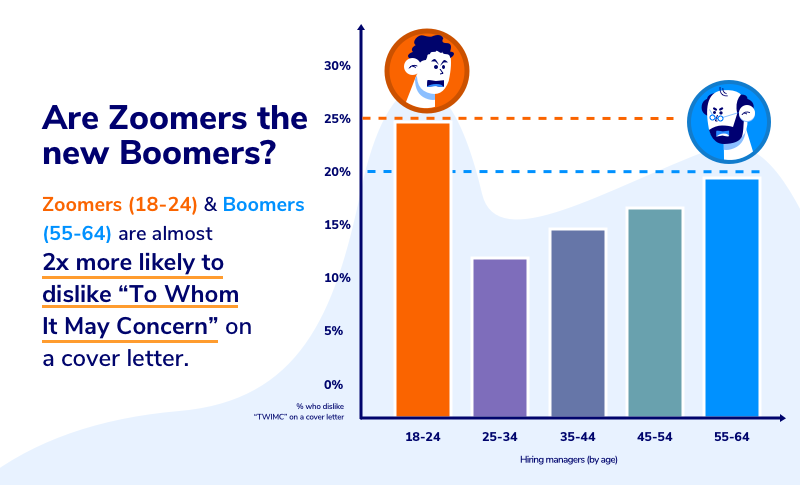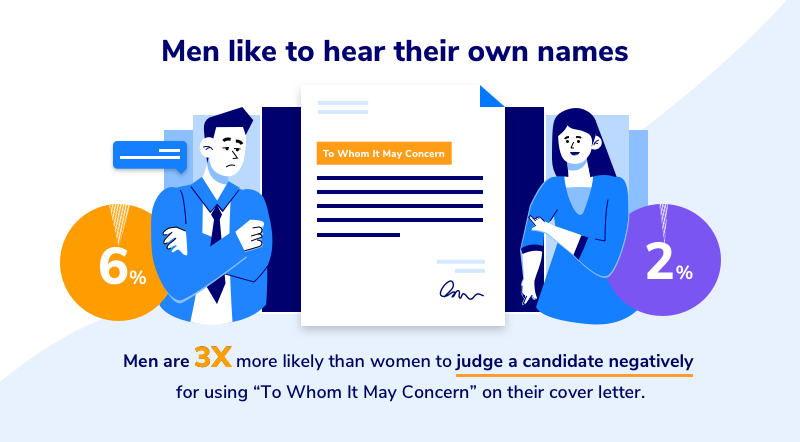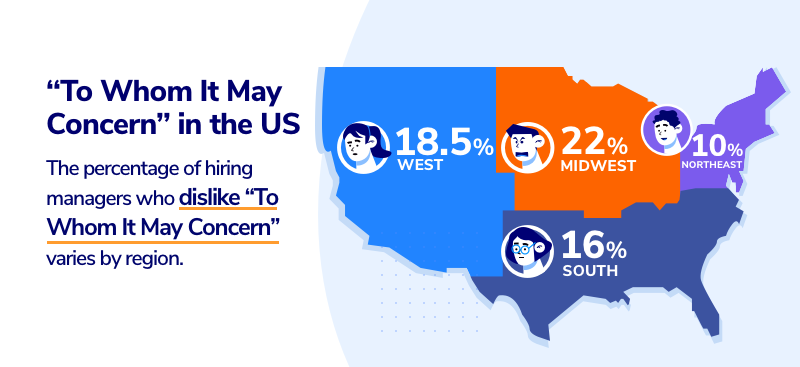Career websites across the internet claim that opening your cover letter with “To Whom It May Concern” can sink your job prospects. But does it actually matter at all? We interviewed over 1,000 hiring managers to find out the answer.
A fine first impression: 83% of hiring managers revealed that seeing “To Whom It May Concern” on a cover letter would have little or no impact on their hiring decision.
Nobody hates opening a cover letter with “To Whom It May Concern” quite like so-called career experts.
If you only read career blogs, you’d quickly come to the conclusion that hiring managers take one look at your cover letter, see “To Whom It May Concern,” and promptly toss your application into a paper shredder.
Never use “To Whom it May Concern” or “Dear or Sir or Madam”—nothing could be more generic (not to mention archaic). -The Muse
But that got us thinking: there are countless job-seekers who address their cover letters this way — they can’t all be jobless, can they? We wanted to see for ourselves if “To Whom it May Concern” was as problematic as it’s portrayed across the internet.
To find out more about whether seeing it on a candidate’s cover letter would impact how they viewed that candidate’s application, we surveyed over 1,000 hiring managers and recruiters.
The results were shocking.
More than 83% of respondents admitted that seeing “To Whom it May Concern” would make little or no impact on their decision to hire someone.

This striking number goes against what career websites (including ours!) have claimed for years — that your cover letter opening must be personalized to the reader, or it will destroy your chances of getting an interview.
It seems that how you start a cover letter isn’t as important as we’ve all been led to believe.
Read on to learn more about what hiring managers think of “To Whom It May Concern,” including statistics based on:
Age: Gen Z and Boomers are the most likely to reject an applicant for starting their cover letter with “To Whom It May Concern.”
Imagine someone who might reject a cover letter based solely on it starting with “To Whom It May Concern.” Now picture their age.
Chances are, you’re probably envisioning an older professional, right? Maybe someone over 50? After all, it seems logical that they’d be the most attached to traditional ideas about formality in the hiring process.
However, our research revealed that the most likely age group to reject a cover letter based on its salutation is, in fact, professionals between the ages of 18 and 24.
The second most likely age group to reject an applicant for a generic introduction — perhaps unsurprisingly — is older hiring managers between the ages of 55 and 64. So if you envisioned a baby boomer, you’re still partially correct:

Meanwhile, hiring managers between the ages of 25 and 34 cared the least about how candidates start their cover letters.
Maybe less surprising are how results were divided by gender:
Gender: male hiring managers are 3X more likely to reject an applicant for addressing them as “To Whom It May Concern” than their female counterparts.
While the vast majority of both men and women admitted that using a generic opener for your cover letter is insignificant, men clearly had stronger feelings about the topic.
If your application is being read by a man, you may want to take time to track down their name, because 6% of men — compared to 2% of women — responded that it’s “very likely” they would not hire a candidate who addressed them as “To Whom It May Concern” in their cover letter.

Overall, 82% of men and women agreed that using a generic opener for your cover letter doesn’t actually impact your hireability.
However, these numbers look a little different depending on where you live in the United States.
Region: Midwestern charm? Midwesterners are the most likely to reject an applicant for starting their cover letter with “To Whom It May Concern.”
New Yorkers pride themselves on their pizza, while southerners brag about their barbeque. It’s no secret that every region in the United States has its own distinct flavor.
So it might not come as a surprise that food isn’t the only area where Americans’ tastes differ by region. According to our research, hiring managers perceive your cover letter introduction differently depending on where they’re from.
If you’re applying for jobs in Boston or New York, you’re in luck: respondents residing in the Northeastern United States cared the least about whether or not a candidate opens their cover letter with “To Whom It May Concern.”

In contrast, 22% of hiring managers from the US Midwest admit that seeing a generic introduction on a cover letter would make them less likely to hire that candidate. This means the Midwest is the strictest geographic region in the US when it comes to cover letter etiquette.
Meanwhile, hiring managers from the South and West are more in the middle, with roughly 80% claiming that the use of “To Whom It May Concern” on a cover letter would not impact their decision.
Ignore the career experts: “To Whom It May Concern” is no big deal.
Bottom line? If you’re unable to find a hiring manager’s name, our research proves that starting your cover letter with “To Whom It May Concern” isn’t the career-killer that experts make it out to be.
However, it’s still not the ideal way to open your cover letter. So before resorting to a generic introduction, first make an effort to find the hiring manager’s name by using the following methods:
- Check the company website: See if you can find the hiring manager on the website’s “About Us” page, or check to see if they have a directory available.
- Search LinkedIn: Find the company on LinkedIn and browse through their listed employees.
- Search on Google: A quick Google search can help you track down the hiring manager, even if their information isn’t readily available on the company website.
- Contact the company: As a last resort, try just calling the company. Explain that you’re applying for a position and that you’d like to address your cover letter to the hiring manager.
Just remember that if you’re unable to find the hiring manager’s name, don’t worry. Chances are the person reading your application won’t mind at all, as long as you actually know how to write a great cover letter, of course!








